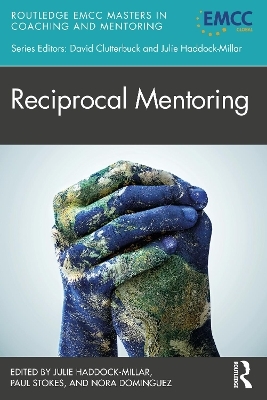
Reciprocal Mentoring
Routledge (Verlag)
978-1-032-29891-7 (ISBN)
Reciprocal mentoring represents an approach to mentoring in organisations that is both timely and of critical importance in the context of diversity, inclusion, equity, and the power shift in mentoring practice. This book provides insight into how reciprocal mentoring programmes can strengthen mutual learning and encourage true partnership between participants.
This approach to mentoring places participants on a level playing field; people with disparate expertise, backgrounds, and experience levels are placed in relationships in which they act as both mentor and mentee, generating a range of benefits for all involved. This book explores the design, development, and evaluation of reciprocal mentoring programmes in six different contexts: entrepreneurial, healthcare sector, third sector, education sector, membership organisations, and private sector organisations. Three different approaches to reciprocal mentoring programmes are set out: reciprocal by design, reciprocal by default, and reciprocal as an output. Each chapter describes a number of different case studies that adopt a variety of approaches to reciprocal mentoring programmes, their contextual relevance, and overall impact and contribution.
This book will be useful for any individuals and teams involved in the development of mentoring programmes. The range of approaches and frameworks presented in this book will benefit mentoring and coaching practitioners, managers, consultants, professionals in a variety of organisational contexts, and researchers.
Julie Haddock-Millar is Associate Professor of Human Resource Development at Middlesex University and Visiting Professor at the International University of Monaco. She is the European Mentoring and Coaching Council (EMCC) Global Work Group Lead for the International Standards for Mentoring and Coaching Programmes and a Master Practitioner coach and mentor. Paul Stokes is Associate Professor of Coaching and Mentoring at Sheffield Business School, Sheffield Hallam University, United Kingdom. He is a Master Practitioner within the European Mentoring and Coaching Council and an experienced consultant, researcher, coach, mentor, and coach-supervisor. Nora Dominguez, Ph.D., is the director of the Mentoring Institute at the University of New Mexico (UNM) and president emeritus of the International Mentoring Association (IMA). Dominguez earned her Ph.D. in Organizational Learning and Instructional Technologies from the UNM.
1. Introduction 2. Reciprocal Mentoring in the Entrepreneurial Sector 3. Reciprocal Mentoring in the Healthcare Sector 4. Reciprocal Mentoring in the Third Sector 5. Reciprocal Mentoring in the PK-12 Education Sector 6. Reciprocal Mentoring for Students and Staff in Higher Education 7. Reciprocal Mentoring for Faculty in Higher Education 8. Mentoring in Membership Organisations 9. Reciprocal Mentoring in Private Sector Organisations 10. Conclusions: Towards a theory of reciprocal mentoring
| Erscheinungsdatum | 15.09.2023 |
|---|---|
| Reihe/Serie | Routledge EMCC Masters in Coaching and Mentoring |
| Zusatzinfo | 16 Tables, black and white; 12 Line drawings, black and white; 12 Illustrations, black and white |
| Verlagsort | London |
| Sprache | englisch |
| Maße | 156 x 234 mm |
| Gewicht | 520 g |
| Themenwelt | Geisteswissenschaften ► Psychologie ► Allgemeine Psychologie |
| Geisteswissenschaften ► Psychologie ► Arbeits- und Organisationspsychologie | |
| Medizin / Pharmazie ► Medizinische Fachgebiete ► Psychiatrie / Psychotherapie | |
| Sozialwissenschaften ► Pädagogik ► Sozialpädagogik | |
| Sozialwissenschaften ► Soziologie | |
| Wirtschaft ► Betriebswirtschaft / Management ► Personalwesen | |
| ISBN-10 | 1-032-29891-X / 103229891X |
| ISBN-13 | 978-1-032-29891-7 / 9781032298917 |
| Zustand | Neuware |
| Informationen gemäß Produktsicherheitsverordnung (GPSR) | |
| Haben Sie eine Frage zum Produkt? |
aus dem Bereich


